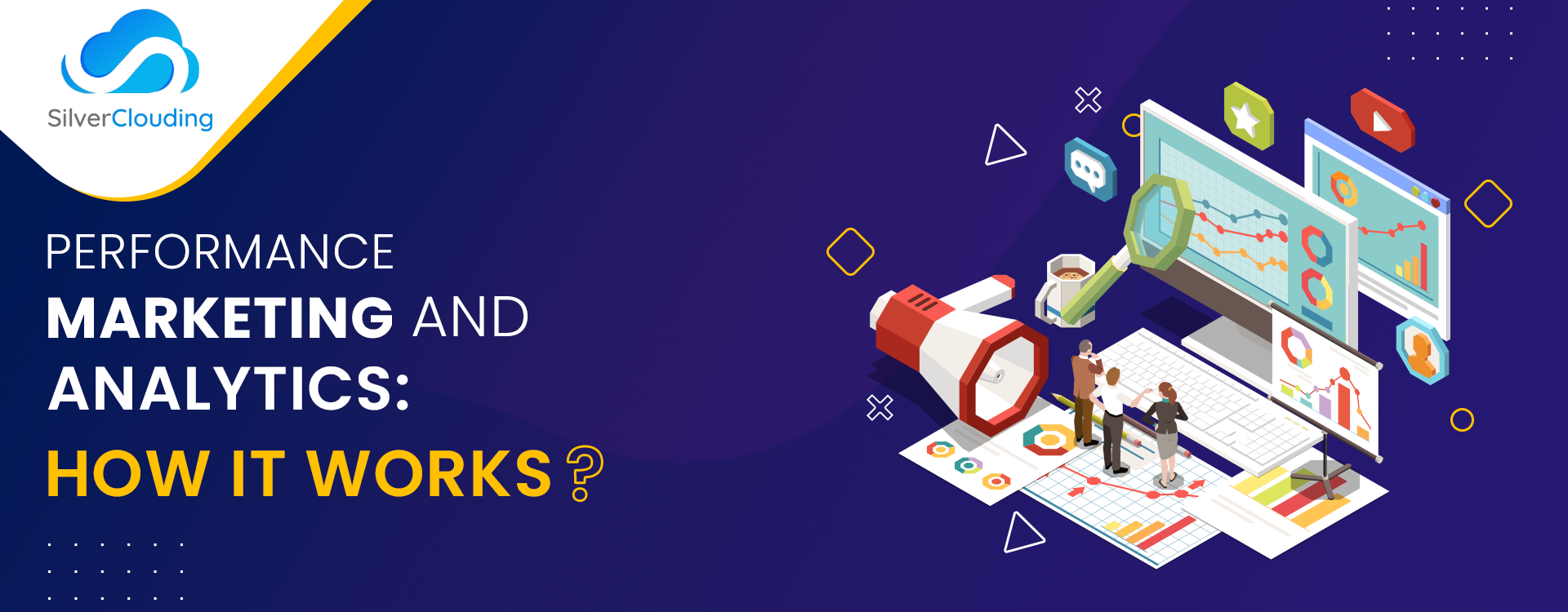The advent of technology and social media has revolutionized the marketing industry, leading to the rise of digital marketing and performance marketing. With increased access to customer data, digital marketing analytics has become essential in planning, executing and measuring marketing activities.
Performance marketing and analytics are two critical components of any successful digital marketing strategy. In this blog, we’ll explore how performance marketing and analytics work together to drive success.
What is Performance Marketing?
Performance marketing, a prominent digital marketing method, allows organizations to pay affiliates and advertising platforms only when a pre-determined target is met, improving budgeting and outcomes.
In the age of marketing analytics, organizations need more data to make customer-targeting decisions. Performance marketing allows organizations to reach customers at a low cost and target the proper audience. Companies can maximize their marketing with the correct tools to evaluate and assess campaign results.
What is Analytics?
Analytics gathers and analyzes data for better decision-making. It provides insights into customer behavior and the effectiveness of marketing efforts.
Marketing analytics uses data from customer behavior, sales trends, and campaign performance to improve marketing strategy. Digital marketing analytics measures and analyzes website traffic, social media interaction, email marketing, and other digital channels.
Types of Analytics that can be used in Performance Marketing for your e-commerce
The types of analytics that can be used in performance marketing for e-commerce include customer behavior analytics, website traffic analytics, conversion rate analytics, and marketing campaign analytics.
Here are the 4 types of Analytics that can be utilized in performance marketing to help your business grow-
Customer Behavior Analytics:
Consumer behavior analytics gathers and analyzes customer data. This helps organizations understand client preferences, demands, and behavior. Businesses can use this data to improve customer experiences and conversions.
Website traffic analytics:
It involves gathering and analyzing website visitor data. These statistics include visitors, pageviews, bounce rate, average session time, and more. This data can help website owners understand their audience’s behavior and enhance performance.
Conversion rate analytics:
It refers to the measurement and analysis of the percentage of website visitors who take a desired action, such as making a purchase, filling out a form, or subscribing to a service. By tracking and analyzing conversion rates, businesses can optimize their websites and marketing strategies to improve overall performance and achieve their goals.
Marketing campaign analytics:
Manage, analyze, and measure marketing initiatives to improve future campaigns. Tracking and evaluating metrics like click-through rates, conversion rates, cost-per-acquisition, return on investment, and other KPIs helps determine how marketing activities affect corporate goals. Marketing campaign analytics can help marketers make data-driven decisions and boost marketing success.
How to use Analytics effectively in Performance Marketing?
Performance marketing aims to generate leads or sales while marketing analytics tracks and analyzes data to evaluate marketing channels and programs.
Performance marketing analytics requires a thorough understanding of corporate goals and target audiences. Track and analyze your marketing channels and campaigns with digital marketing analytics. It can be improved by comparing results to company goals. Analytics can help you fix a marketing channel or campaign that’s underperforming.
How to measure Analytics effectively in Performance Marketing?
Measuring analytics effectively in performance marketing is crucial to determining the success of your marketing efforts and optimizing your strategies for better results. Here are some key steps to measure analytics effectively in performance marketing:
• Establish your KPIs: Define your performance marketing KPIs to gauge success. Traffic, conversion rates, lead generation, revenue, and ROI are examples.
• Tracking: You need the correct tools to measure KPIs. Set up Google Analytics, tracking pixels, or a CRM system to track customer activity and sales.
• Analyze the data: After collecting the data, examine it to learn about your marketing activities. Find patterns and ways to improve your performance marketing.
• Optimize your plan: Use data to optimize your performance marketing strategy. To boost performance, alter targeting, messaging, or channels.
• Test and refine: Constantly test and refine performance marketing approaches to improve results. A/B testing, ad type testing, and landing page optimization may help increase conversion rates.
By following these steps, you can effectively measure analytics in performance marketing and use data-driven insights to optimize your strategy for better results.
What Performance marketing is not?
Performance marketing targets lead generation, sales, and website traffic. Performance marketing includes many methods and channels, but there are some misconceptions about what it is not.
Here are some things that performance marketing is often mistakenly thought to be, but actually isn’t:
- Brand awareness campaigns: While brand awareness is an important aspect of marketing, it is not the primary goal of performance marketing. Instead, performance marketing is all about driving specific actions or outcomes that can be measured and optimized.
- Mass media advertising: Performance marketing is typically more targeted and measurable than mass media advertising, which is designed to reach a broad audience. Performance marketing tactics are often focused on specific customer segments or audiences.
- A quick fix: Performance marketing is not a quick fix for low sales or traffic. It requires a strategic approach that is focused on long-term success and continuous optimization.
Performance marketing is not about brand awareness, mass media promotion, or quick cures. It is a data-driven strategy that drives specific activities or outcomes for long-term success.
How Silverclouding can assist you in performance marketing?
We at Silverclouding can play a crucial role in assisting with performance marketing by leveraging our expertise.
From optimizing your Shopify store to implementing effective marketing tactics and tracking metrics, we can help you improve the performance of your online business. By partnering with us, you can gain the insights and support needed to develop a data-driven approach to performance marketing that drives specific actions or outcomes, such as lead generation, sales, or website traffic.




